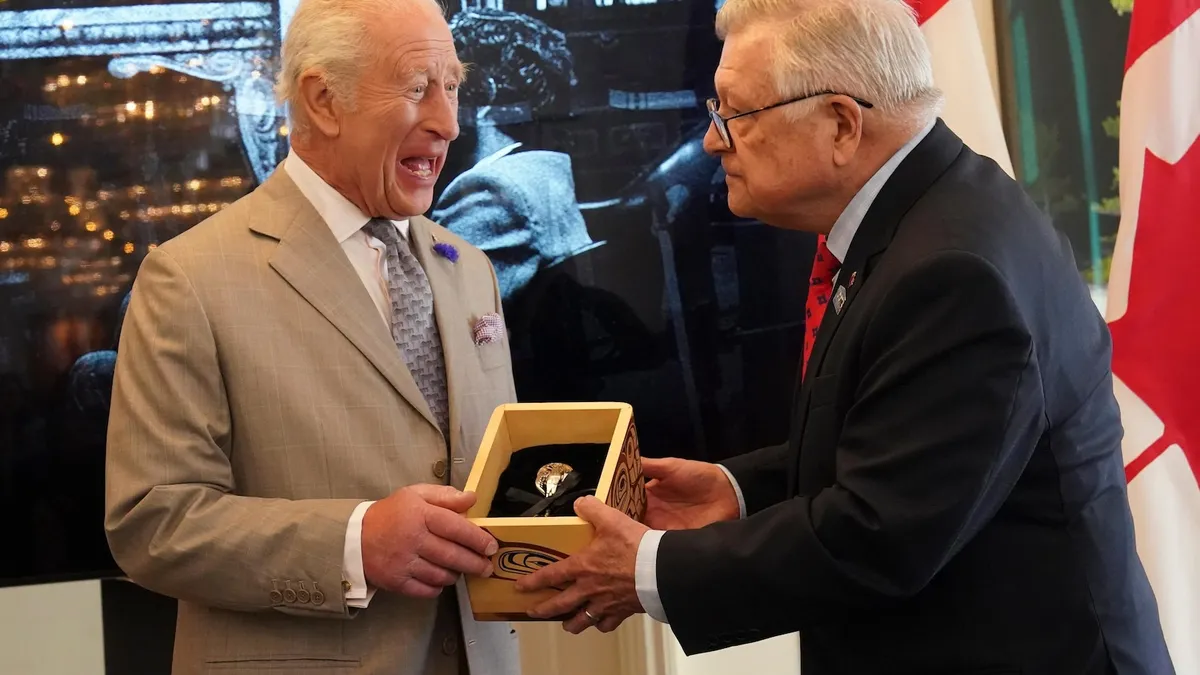
On Monday, King Charles III is set to arrive in Ottawa, Ontario, marking a significant visit that emphasizes Canada's sovereignty in light of comments made by former U.S. President Donald Trump. Trump's repeated suggestions for the U.S. to annex Canada prompted Prime Minister Mark Carney to invite the King to deliver the speech from the throne, which outlines the government's agenda for the new Parliament session. This visit serves as a reminder of Canada's status as a member of the British Commonwealth and the enduring ties that connect the two nations.
Upon his arrival, King Charles III will be greeted by Prime Minister Carney, Canada’s first indigenous Governor General Mary Simon, and a 25-member honor guard from the Royal Canadian Dragoons, of which the King serves as colonel-in-chief. Simon remarked that the presence of the King and Queen Camilla at this pivotal moment in Canadian history holds “profound significance.” She emphasized that their visit reaffirms the constitutional bond that has shaped Canada into a proud and independent nation.
Prime Minister Carney echoed these sentiments, stating that the visit highlights the “vitality of our constitutional monarchy and our distinct identity.” While many Canadians may feel indifferent toward the monarchy, Carney aims to showcase the differences in governance between Canada and the United States. The King’s visit reinforces Canada's sovereignty, a key point for Carney during these discussions.
It is relatively rare for a monarch to deliver the speech from the throne in Canada. King Charles's mother, Queen Elizabeth II, performed this duty twice during her 70-year reign, with the last occurrence in 1977. Despite the general indifference toward the monarchy among Canadians, the significance of this visit cannot be overstated. Former Quebec Premier Jean Charest pointed out that recognizing King Charles's role in delivering the throne speech invites reflection on Canada’s unique historical narrative.
The new U.S. ambassador to Canada, Pete Hoekstra, commented that the discussions regarding Canada as the “51st state” should be put to rest. He suggested that if there was a message to convey, it could be done through direct communication rather than through ceremonial visits. Royal historian Carolyn Harris noted that Trump’s admiration for the royal family might prompt him to take notice of King Charles’s visit, especially given their distinct histories that diverged after the American Revolution.
The speech from the throne, scheduled for Tuesday, will not be written by King Charles or his advisors; instead, he will read what is prepared by the Canadian government. This nonpartisan role is crucial, as King Charles can only act with the consent and advice of Prime Minister Carney. Canadian royal historian Justin Vovk explained that the King must navigate his responsibilities carefully, ensuring that he does not compromise the other Commonwealth realms.
Canadians expressed discontent when U.K. Prime Minister Keir Starmer extended a state visit invitation to Trump during a period of heightened tensions regarding Canadian sovereignty. Carney clarified that this gesture was poorly received given the context. Recently, King Charles has shown support for Canada, notably wearing Canadian military medals during a visit to a British aircraft carrier.
Following his arrival, King Charles will participate in a ceremonial event, including dropping the first puck at a street hockey game and attending a community event where he will meet with Prime Minister Carney. Additionally, Queen Camilla will take part in a swearing-in ceremony to become a Canadian privy councillor, allowing her to provide advice to the King regarding Canadian affairs. After delivering the throne speech and visiting Canada's National War Memorial, King Charles will return to the U.K., concluding this important visit.